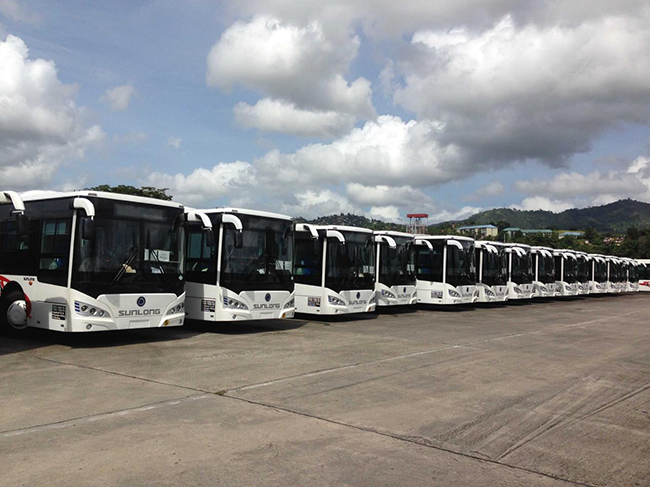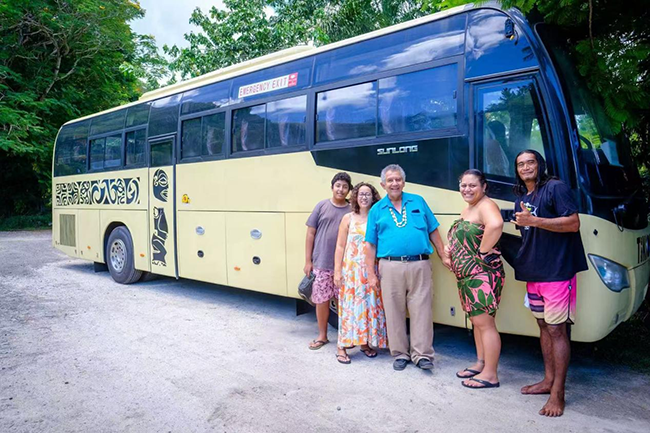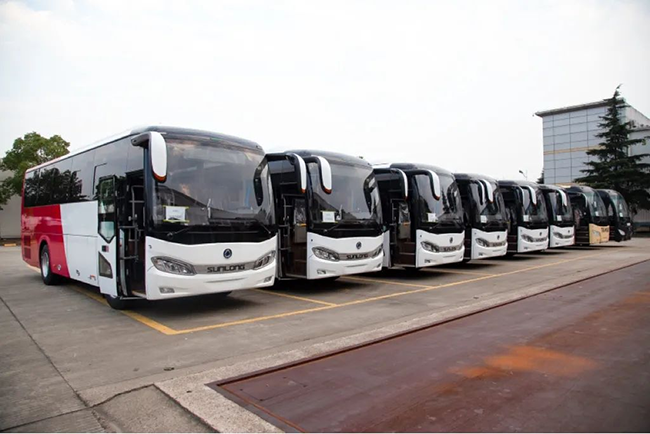In order to celebrate the 103rd anniversary of the founding of the CPC, on June 29, the party branch of Guangxi Sunlong Automobile Manufacturing Co., Ltd. went to Tiandong County, Baise City, Guangxi, the old revolutionary base area, to carry out the party day activity themed by the "July 1" party building day. Nearly 30 members of the branch, development targets, and active party applicants participated in this activity.

Image: Group photo at Red Army Square
Tian Dong was the birthplace of the Baise Uprising and the location of the Right Jiangsu Weie Government. In 1929, Deng Xiaoping, Zhang Yunyi, and other older generation proletarian revolutionaries led and launched the powerful Baise Uprising in southern Xinjiang, establishing the 7th Army of the Chinese Red Army and the first red revolutionary regime in Guangxi - the Right Jiangsu Weie Government. The main red education bases in the local area include the former site of the Youjiang Workers' and Peasants' Democratic Government (Youjiang Revolution Memorial Hall), Erya Wharf (Red Army Wharf), Red Army Pavilion, Baigu Red Army Village, Naheng Village Revolutionary History Museum, etc.

Image: Visiting the Red Army Pier and Red Army Pavilion
On the day of the event, all members of the branch followed the footsteps of the Red Army team and retraced their steps on the Red Army Road, first arriving at the Red Army Pier and Red Army Pavilion. Through explanation, the historical scene of Deng Xiaoping and Zhang Yunyi leading troops into Tiandong to prepare for an armed uprising was reviewed. On October 17, 1929, Deng Xiaoping, Zhang Yunyi, and others led the armed forces controlled by the Party and a fleet loaded with military supplies to split the water and land routes from Nanning to the Youjiang River, preparing for an armed uprising. On October 20th, the military fleet arrived at Pingma Erya Pier. Deng Xiaoping took firm steps and set foot on the hot land of Tiandong, where he met with the land troops led by Zhang Yunyi.

Image: A photo taken at the former site of the Youjiang Workers' and Peasants' Democratic Government
With the same firm steps, all members of the branch came to the former site of the Youjiang Workers' and Peasants' Democratic Government to visit and learn. The former site of the Youjiang Workers' and Peasants' Democratic Government, also known as the Youjiang Revolution Memorial Hall, was originally the Pingma Jingzheng Academy in Enlong County (now Tiandong). In 1929, on the eve of the Baise Uprising, Deng Xiaoping, Zhang Yunyi, Lei Jingtian and other major revolutionary leaders in the Youjiang area worked and lived here. On December 11, 1929, the Baise Uprising was declared successful. On the same day, the Youjiang Workers' and Peasants' Democratic Government was established at the Jingzheng Academy, leading the revolutionary struggle in Youjiang and even the entire Guangxi. It was the location of the highest red political power in Guangxi at that time.


Image: Visiting the Youjiang Revolution Memorial Hall
Under the vivid explanation of the on-site announcer, all the staff learned the glorious course of the CPC leading the Youjiang people to carry out arduous revolutionary struggle and win, and felt the original mission of the Communist Party members in the scene after scene. Here, the branch held a solemn ceremony for probationary party members to take the oath of joining the party and for veteran party members to review the oath of joining the party. All party members, with passionate vows, demonstrate their firm ideals and beliefs of living up to the legacy of their predecessors, never forgetting their original aspirations and missions, and striving for progress.

Image: Preparatory Party members taking the oath to join the Party, veteran Party members revisiting the oath ceremony to join the Party
Subsequently, all personnel arrived at Baigu Red Army Village and visited the Baigu Red Army Village Exhibition Hall, Revolutionary Martyrs Monument, and other facilities. Learned the heroic deeds of the people of Baigu who, under the leadership of the Party organization in the Youjiang area of the Communist Party of China, persisted in long-term struggle and were not afraid of sacrifice; At the same time, I truly experienced the unwavering revolutionary faith and revolutionary spirit of the martyrs in Baigu Village, who treated death as their own, resisted tenaciously, and sacrificed themselves.

Image: Visiting the Exhibition Room of Baigu Red Army Village
The last stop of the activity is the Naheng Village Revolutionary History Museum. I mainly learned about the participation of the people of Naheng in the democratic revolution, especially the heroic deeds of the Red Army soldiers in Naheng Village who fought bravely and sacrificed their lives for the country. In October 1930, 30 Red Army soldiers from Naheng Village joined the Red Seventh Army and marched north to participate in the revolution. When they arrived in Jiangxi, 14 soldiers had already sacrificed their lives for the country, and some of the surviving soldiers participated in the world-famous 25000 mile Long March.

Image: Visiting the Naheng Village Revolutionary History Museum
The original intention remains unchanged, and the struggle never ceases. Taking this theme party day activity as an opportunity, Guangxi Sunlong Party Branch, on the occasion of the 103rd anniversary of the founding of the CPC, reviewed the struggle history of the party, inherited and carried forward the glorious tradition of the party, and further improved the cohesion, appeal and combat effectiveness of the party organization by visiting the Red Education Base in Tiandong County, an old revolutionary base area; At the same time, educate and motivate all party members to continue the red bloodline, draw on the strength of progress, keep in mind the original aspiration and mission, continue to write the glory of the party, and devote themselves to work and entrepreneurship with more enthusiasm and high spirits, striving for the sustained and steady development of enterprises, empowering the growth and strengthening of the new energy vehicle industry, adding bricks and tiles to the development of the national economy, and contributing to the great rejuvenation of the Chinese nation.

Image: A group photo taken at the Naheng Village Revolutionary History Museum







